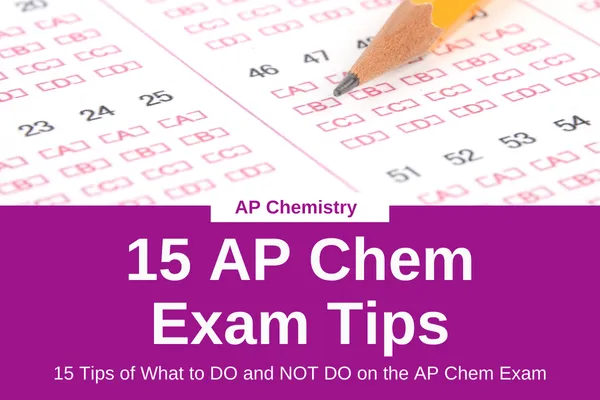My Blog
Tips, Resources, and Strategies for High School Science

15 AP Chem Exam Tips
If your teen is getting ready for the AP Chemistry exam, you're probably wondering how to help, especially if it's been a minute since you’ve thought about moles, ions, or gas laws.
The good news? You don’t need to re-learn chemistry to support your teen’s success. In fact, what many students really need at this stage isn’t more facts, it’s better habits.
Over the years, I’ve gathered several strategies and tips from fellow AP Chemistry teachers, mentors, and students. These are the small-but-mighty habits that consistently help students earn points, and avoid common mistakes, on the exam. This list has evolved over time and been shared, reshaped, and refined to tips I’ve found to be key in my students’ mindset when tackling FRQs.
Now, I’m sharing it with you so you can help your teen build these habits before test day rolls around.
Why Exam Habits Matter (Even More Than Content)
The Free Response (FRQ) section of the AP Chemistry exam is where students can really shine, or where they can lose points for reasons that have nothing to do with their understanding of chemistry.
Answers that are technically correct can still be marked down if they’re missing a unit or justification.
A messy answer or vague explanation could cost points, even if the logic is there.
A great comparison won’t earn credit unless it addresses both items and uses specific terms.
Helping your teen recognize how they present their answers is just as important as reviewing the content.
15 Tips for AP Chemistry FRQs
Use this chart as a guide to what your teen should focus on doing when they practice and review. These habits are simple to implement—and they pay off big.

How Parents Can Help (Even Without Knowing Chemistry)
Supporting your teen isn’t about re-teaching stoichiometry. It’s about helping them build awareness. Here's how to make this list practical and useful at home:
1. Print the chart and keep it visible
Stick it on a corkboard, binder cover, or study wall. This makes it easy for your teen to reference it every time they practice.
2. Ask reflective questions after practice sessions
Even if you don’t know the answers, you can ask:
“Did you show all your work?”
“Did you answer every part of the question?”
“Are your units and variables clear?”
These small prompts encourage your teen to self-check before exam day.
3. Check one question together per week
Pick one problem and review it together. Celebrate the habits they’re doing well, and gently point out where they can improve using the chart.
4. Focus on progress, not perfection
Every time your teen catches a mistake or adds a missing unit on their own, that’s a win. Encourage them to keep building that habit.
Final Thoughts
Your teen doesn’t need to be perfect. They just need a plan. With a little support and awareness, they can avoid common exam mistakes and show what they truly know on test day.
You don’t have to speak the language of chemistry to make a real difference. You just have to show up, ask a few great questions, and keep the encouragement coming.
You’ve got this—and so do they!
All Rights Reserved 2023 - (C) TheScienceMentor.com -TM | Terms & Conditions | Privacy Policy | Disclaimers
